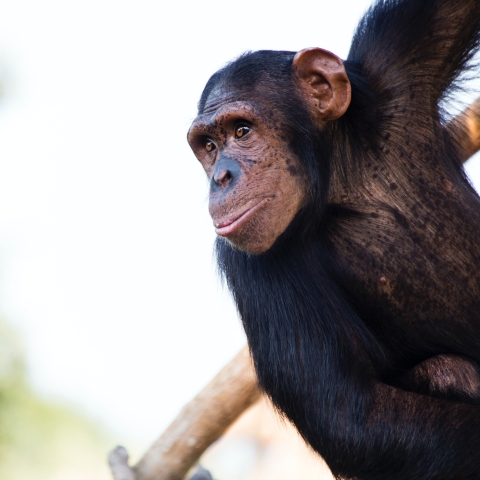
Psychology is the scientific study of the mind, of conscious and unconscious phenomena, and the way humans and other species think, feel and behave.
Our fundamental and applied psychology research reflects the broad scope of psychological study, exploring topics from child development of social skills to eye witness testimony, from the evolution of primate facial expressions to the factors affecting drug use.
Our psychology researchers are addressing important issues in society, whether helping law enforcement agencies prosecute, developing methods to improve wellbeing and quality of life, supporting animal conservation and welfare initiatives, or unpacking the basics of psychological functioning.
Our research contributes to the University's Health and Wellbeing research theme, which seeks to improve society through enhancing health and wellbeing, and the University’s Security and Risk theme, which seeks to address the challenges of maintaining the security of individuals, organisations and societies in an interconnected world.
Equally, our work in behavioural ecology, animal welfare and environmental conservation addresses key issues surrounding the University’s Sustainability and the Environment theme.
While our research into the building blocks of social interaction, group processes and the evolution of human and animal societies ties into the Democratic Citizenship theme, by providing insights into contemporary culture, and the changes and challenges faced by people around the world.
Research in the School of Psychology, Sport and Health Sciences
Learn about the leading research being carried out within the School of Psychology, Sport and Health Sciences at the University of Portsmouth.
Leanne Proops: Here in the psychology department at the University of Portsmouth. We really pride ourselves in having all of our staff being research active, not only for the research that they do themselves, but also so that we can inform our teaching and really be at the cutting edge of each of our fields. We research a whole wide range of different areas. Here in the department, we have four longstanding research fields and they include our International Centre for Research into Forensic Psychology, our Centre for Comparative and Evolutionary Psychology, the Centre for Interaction, Development and Diversity and our Quality of Life, Health and Well-Being Group.
[International Centre for Research in Forensic Psychology]
Renan Saraiva: Some of our research is on lie detection in forensic contexts, eyewitness testimony, risk assessment, and jury decision-making. The overarching goal of our research is to create safer and more just societies in terms of improving our criminal justice systems, not only in the UK but also worldwide. So achievable goals, a lot of our research focuses on, for example, creating better procedures for investigations and creating innovative procedures for risk assessment.
[International Centre for Research in Forensic Psychology – Centre for Comparative and Evolutionary Psychology]
Ed Morrison: My research generally is in the area of human evolutionary psychology. So the idea of this is seeing how evolution shapes our behaviour and in particular within the area, I look at human mate choice. As soon as we meet anyone, we'll make a kind of instant judgement sort of based on what they look like. Do I like them? Do I not like them? Are they a threat? So it has big personal importance and then big evolutionary importance as well, because finding a partner that's going to be the way that you pass your genes on to the next generation.
Mohammed Ismeil Abdul Kader: The research is really important because in terms of understanding how we make judgements about each other in social situations, we almost are never presented with pictures except when we look at pictures online or on devices. So we constantly make judgements on moving people. So either they're walking or they're talking or they're gesturing. So it's essential to understand that element of it. So we understand the complete picture of the way that we interact with each other and the kind of decisions that we make about each other.
[International Centre for Research in Forensic Psychology – Centre for Interaction, Development and Diversity]
Beatriz Lopez: We have really a very wide set of projects, but they tend to look at how we interact with others, babies and infants, but also in adulthood. So for instance, one of the things we've done is develop profiling assessment tools for autistic people at work. And those have been because we develop them with policymakers, local authorities, with the autistic community. So they've been shown to improve job retention in autistic people, to improve quality of life. But also they have been implemented now in the autism strategy at national level.
[International Centre for Research in Forensic Psychology – Quality of Life, Health and Wellbeing Research Group]
Miznah Al-Abbade: I'm interested in how we can better manage chronic or long-term conditions. More specifically, or more recently, I'm interested in chronic pain and actually women's health. So a recent project is looking at how we can better understand things like period pain. This research is really important because, I mean, it affects 50% of the population. It brings new insights into the project and things that we might not have considered before. It just will make it more comprehensive, really, in tackling things from different angles.
Nills Niederstrasser: We're using the Core Pressure to induce pain and then we're seeing if the way you experience pain is related to your decision-making in a moral choice, dilemma, scenario. Further to that, we have the prevention of pain as well. So how do people recover from injuries? So if people engage in their rehab exercises. Does that lead to less pain during the rehabilitation process, say, following the surgery? Absolutely proud of it. It's always raising some eyebrows when you say you do research in pain, but when you actually start talking about it, people understand that it's worthwhile. It has societal impact and people understand that it's valuable.
Renan Saraiva: I'm very proud to be a part of the centre and seeing those solutions and creative ideas emerging on a daily basis.
Beatriz Lopez: All the members, we have a real passion for what we do and a real passion for doing things that really matter to the community.
Leanne Proops: Portsmouth is a really great place, I think, to come here and conduct research both as a student and as a colleague. We pride ourselves in being really collegiate and working together as a team. We have lots of support for our researchers and we also really like to engage our students in the research process. So it's really important for us to be able to go out to different field sites, to be able to understand different cultures and really get a good understanding of what it's like to be a human across the globe.
Interested in a PhD in Psychology?
Browse our Psychology postgraduate research degrees – including PhDs and MPhils.
Our Psychology research entities
Find out more about the facilities and research methods in psychology that shape our research in the following research entities – including our work in development psychology, dog cognition and wellbeing.
Centre for interaction, development and diversity
In the Centre for Interaction, Development and Diversity, we study psychological phenomena in relation to the contexts and situations in which they emerge.

Centre for Comparative and Evolutionary Psychology
In the Centre for Comparative and Evolutionary Psychology, we're exploring evolutionary processes and comparing humans with other animals, to study the origins of behaviour.

International Centre for Research in Forensic Psychology
The ICRFP has an established international reputation for conducting a broad range of criminological and forensic psychology research.

Quality of Life Health and Wellbeing Research Group
We explore life experiences. Our research includes empowering people with learning disabilities, exploring wellbeing, enhancing life in later years, and more. Read more.

Dog Cognition Centre
In the Dog Cognition Centre, we're exploring the behaviour and cognitive processes of man's best friend – and studying everything from human-dog communication, to facial expressions in dogs.

Autism Centre for Research on Employment
ACRE addresses the gap in provision for autistic adults in terms of employment and to facilitate job retention by developing tools to support employers.

Take part in our research studies
We're always looking for volunteers to join our research study programmes.
If you're an adult interested in registering for a research study, please fill in the following form.
If you're interested in registering a child for a research study, please fill in the following form.
